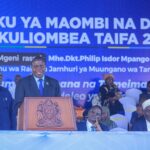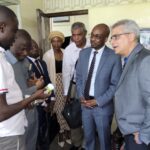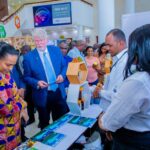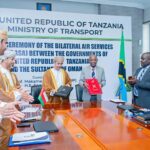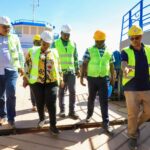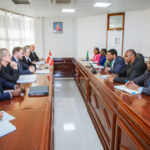On 20 July 2024, a significant milestone in Tanzania’s journey towards sustainable development was marked by the inaugural conference on the formulation of the National Development Vision 2050. The event, held at the picturesque Kwatunza Beach Resort in the Mwanza Region, was presided over by the Honourable Dr. Doto Biteko, Deputy Prime Minister and Minister of Energy of the United Republic of Tanzania. This conference represents a pivotal moment in the nation’s history, as it sets the stage for a comprehensive and forward-looking strategy aimed at propelling Tanzania into a prosperous and sustainable future.

Setting the Stage for Vision 2050
The National Development Vision 2050 represents an ambitious blueprint designed to guide Tanzania’s socio-economic development over the next three decades. The overarching objective of the vision is to facilitate the transformation of Tanzania into a middle-income country, characterised by inclusive growth, sustainable development and an enhanced quality of life for all its citizens. The formulation of this vision is the result of a collaborative effort involving a number of stakeholders, including government officials, representatives of the private sector, members of civil society, and international partners.
The selection of Kwatunza Beach Resort as the setting for this pivotal occasion was emblematic. The resort, situated on the shores of Lake Victoria, provided an idyllic and thought-provoking setting for the discussions and deliberations that took place. The natural beauty of the Mwanza Region served as a reminder of the importance of preserving Tanzania’s rich environmental heritage while pursuing economic growth and development.
Keynote Address by Dr. Doto Biteko
In his keynote address, Dr. Doto Biteko underscored the pivotal role of the National Development Vision 2050 and the necessity for a unified effort to attain its objectives. He also drew attention to the progress Tanzania has made in recent years, particularly in the energy sector, and emphasised the importance of building on these achievements in order to create a sustainable and prosperous future.

“Today, we embark on a journey that will have a profound impact on the future of our nation for generations to come,” Dr. Biteko stated. “The National Development Vision 2050 is not merely a document; it is a pledge to our people, our environment, and our future. It constitutes a call to action for all Tanzanians to collaborate towards a common objective of prosperity and sustainability.
Furthermore, Dr. Biteko emphasised the significance of inclusivity in the development and execution of the vision. He advocated for the active involvement of all stakeholders, including marginalised communities, women, and youth, to guarantee that the advantages of development are distributed in a fair and equitable manner.
Panel Discussions and Workshops
The conference comprised a series of panel discussions and workshops, the focus of which was on a range of aspects pertaining to the National Development Vision 2050. The sessions constituted a forum for stakeholders to disseminate their insights, experiences, and recommendations on pivotal issues, including economic diversification, infrastructure development, education, healthcare, and environmental sustainability.
Economic Diversification
One of the principal themes that emerged from the discussions was the necessity for economic diversification. It was emphasised by participants that Tanzania should seek to reduce its reliance on traditional sectors, such as agriculture and mining, and instead promote the growth of emerging industries, including technology, tourism and renewable energy. Such a strategy, they argued, would not only create new opportunities for employment and income generation but also enhance the resilience of the economy to external shocks.
Infrastructure Development
The development of infrastructure was identified as a crucial area of focus. Stakeholders underscored the necessity for substantial investments in transportation, energy, and digital infrastructure to bolster economic growth and enhance the quality of life for Tanzanians. It was recommended that modern and efficient transport networks be developed, that reliable and affordable energy be made more widely available, and that digital connectivity be expanded to rural and underserved areas.
Education and Healthcare
Furthermore, the National Development Vision 2050 identified education and healthcare as key priorities. It was emphasised by participants that improvements must be made to the quality and accessibility of education at all levels, from primary to tertiary, in order to equip Tanzanians with the requisite skills and knowledge to flourish in an era of rapid global change. Similarly, there was a call for investment in healthcare infrastructure and services, with the objective of ensuring that all citizens have access to quality healthcare and can lead healthy and productive lives.
Environmental Sustainability
The concept of environmental sustainability was a prominent and recurrent theme throughout the course of the conference. Stakeholders emphasised the necessity of achieving a balance between economic growth and environmental conservation, and advocated for the implementation of sustainable practices across all sectors of the economy. The importance of safeguarding Tanzania’s natural resources, including its forests, water bodies, and wildlife, was emphasised in order to ensure that future generations can benefit from a healthy and vibrant environment.
International Collaboration and Support: A Pillar for Tanzania’s National Development Vision 2050
The recent conference on Tanzania’s National Development Vision 2050 highlighted the crucial role of international collaboration and support in the country’s future progress. In light of Tanzania’s aspiration to become a middle-income country by 2050, it is evident that global partnerships will play an indispensable role. This article examines the various ways in which international collaboration can facilitate Tanzania’s ambitious developmental objectives, thereby ensuring a prosperous and sustainable future.
The Essence of Tanzania’s National Development Vision 2050
Tanzania’s National Development Vision 2050 represents a comprehensive and integrated blueprint designed to guide the country towards economic prosperity, social well-being, and environmental sustainability. The overarching objective of the vision is to elevate Tanzania to a middle-income status, characterised by a diversified economy, high-quality education, advanced healthcare, and robust infrastructure. The realisation of these objectives necessitates not only domestic endeavours but also substantial international collaboration and assistance.
The Role of International Collaboration
Economic Growth and Investment
One of the principal domains in which international collaboration can exert a substantial influence is that of economic growth. Foreign direct investment (FDI) is a vital contributor to economic growth, providing capital, creating employment opportunities and facilitating technological advancement. A number of countries, including China, the United States, and members of the European Union, have already demonstrated interest in investing in Tanzania’s rapidly developing sectors, such as mining, agriculture, and tourism. By fostering a conducive environment for foreign direct investment (FDI), Tanzania can attract a greater number of international investors, thereby accelerating its economic growth.
Technology Transfer and Innovation
In the contemporary globalized world, technology and innovation are pivotal drivers of development. International collaboration has the potential to facilitate the transfer of cutting-edge technologies and innovative practices to Tanzania. Forming partnerships with technologically advanced nations can assist Tanzania in bypassing traditional stages of development and adopting modern solutions in areas such as renewable energy, healthcare, and education. For example, collaborative efforts with countries such as Japan and Germany have the potential to facilitate the introduction of advanced manufacturing techniques and renewable energy technologies, thereby contributing to the advancement of sustainable development.
Capacity Building and Education
Education constitutes a fundamental pillar of national development. International collaboration has the potential to enhance Tanzania’s educational system by facilitating access to global knowledge, expertise, and resources. The provision of scholarships, exchange programmes and partnerships with renowned universities can facilitate the acquisition of valuable skills and knowledge by Tanzanian students and professionals. Furthermore, international organisations such as UNESCO and UNICEF can facilitate educational reforms and initiatives with the objective of enhancing the quality of education in Tanzania.
The Importance of International Support
Financial Aid and Grants
The provision of financial aid and grants from international organisations and donor countries is of vital importance to the realisation of Tanzania’s development projects. Financial assistance is provided by institutions such as the World Bank, the International Monetary Fund (IMF), and the African Development Bank (AfDB) for the development of infrastructure, healthcare, and poverty alleviation programmes. These financial resources can facilitate the alignment of Tanzania’s developmental aspirations with its financial capabilities, thereby ensuring the successful implementation of the National Development Vision 2050.
Humanitarian Assistance
In periods of crisis, the provision of international humanitarian assistance is of paramount importance. The occurrence of natural disasters, health emergencies and socio-political conflicts has the potential to impede Tanzania’s progress. International organisations, including the Red Cross, the World Health Organization (WHO), and numerous non-governmental organisations (NGOs), play a crucial role in providing emergency relief, healthcare services, and support for displaced populations. Such assistance enables Tanzania to recover from crises and to continue its developmental trajectory.
Policy and Governance Support
The implementation of effective governance and policies is a fundamental prerequisite for the achievement of sustainable development. International collaboration can facilitate access to the most effective practices in governance, policy formulation and implementation for Tanzania. Organisations such as the United Nations Development Programme (UNDP) and the African Union (AU) provide technical assistance and capacity-building programmes with the objective of strengthening Tanzania’s institutional frameworks. The adoption of international standards and practices by Tanzania would facilitate the enhancement of its governance structures, thereby ensuring transparency, accountability, and efficiency.
Case Studies of Successful International Collaboration
The Tanzania-China Partnership
The partnership between Tanzania and China represents a model of successful international collaboration. China has made significant investments in Tanzania’s infrastructure, including the construction of roads, railways, and ports, over the course of many years. Notable examples of Chinese investments that have significantly contributed to Tanzania’s development include the Tanzania-Zambia Railway (TAZARA) and the Bagamoyo Port project.
By capitalising on international collaboration and support, Tanzania can realise the ambitious objectives set out in its National Development Vision 2050. By establishing strategic partnerships, facilitating technology transfer, enhancing capacity building, and providing financial assistance, Tanzania can effectively pave the way for a prosperous and sustainable future.
In conclusion, the conference on Tanzania’s National Development Vision 2050 emphasised the crucial importance of international collaboration and support in achieving the nation’s developmental goals. From economic growth and technology transfer to education and humanitarian assistance, global partnerships present a plethora of opportunities for Tanzania’s progress. By fostering robust international relationships and adopting a collaborative approach, Tanzania can facilitate the creation of a prosperous and sustainable future. As the nation embarks on this transformative journey, the support and cooperation of the global community will be of great consequence in the realisation of the vision of a middle-income Tanzania by 2050.
Tanzania Media
- Kanyala Ferry Launch: TEMESA’s New Service for 15,000 Sengerema Residents (Mwanza) - 18 August 2025
- Russia-Tanzania Naval Cooperation: How the Smolny Training Ship Boosts Dar es Salaam’s Maritime Security - 18 August 2025
- Tanzania’s ICGLR Commitment: Stabilising the DRC & Great Lakes Region - 18 August 2025












